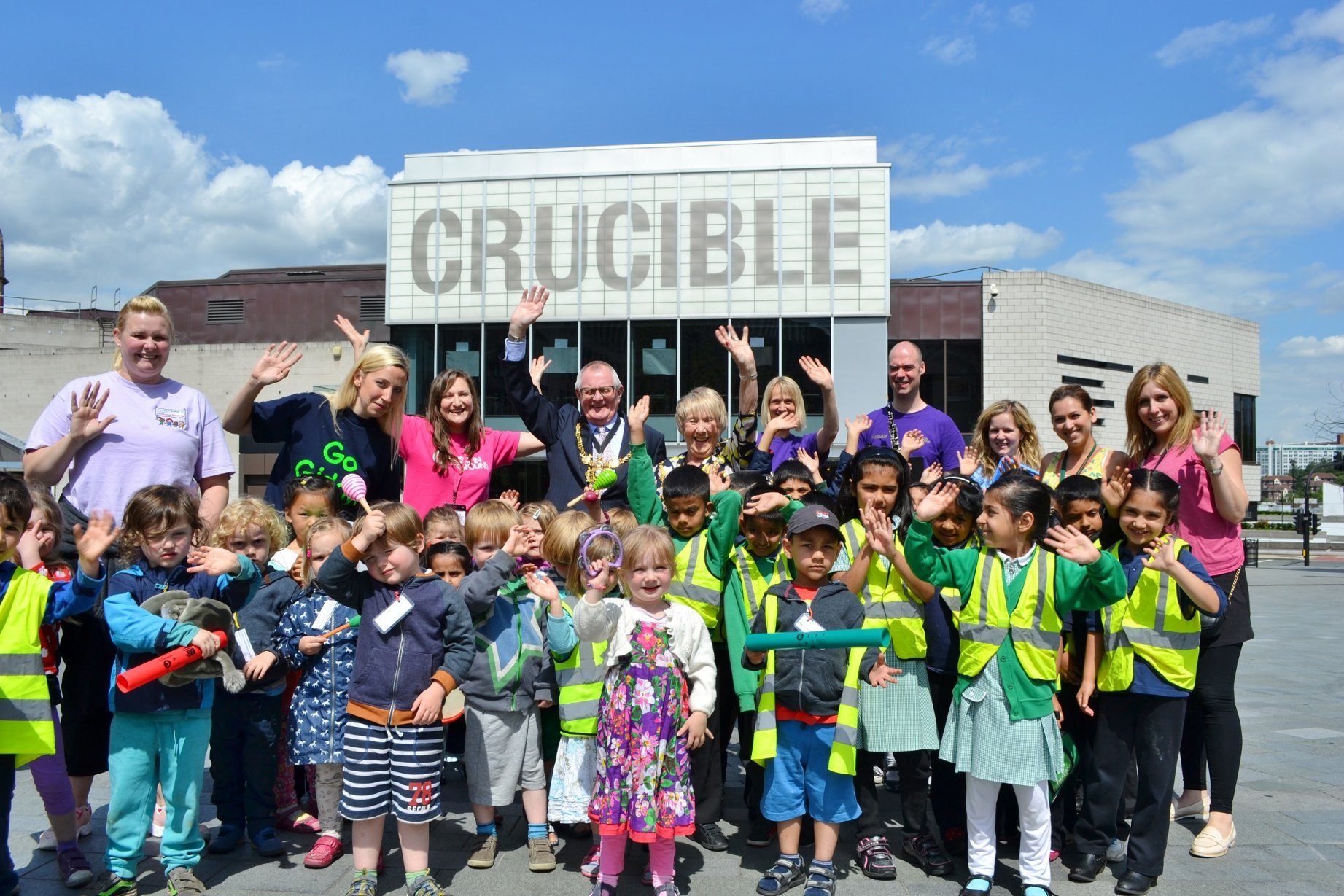
Children with Ensemble 360 musicians, Polly Ives and the Lord Mayor of Sheffield
Photo: Fraser Wilson
Listen, play and learn
A recent conference explored the value of music-making with early years and key stage 1 children. Fraser Wilson and Emily Moss describe the event’s discussions and activities.
For many years, we at Music in the Round have worked with schools and nurseries in our home city of Sheffield and around the UK, delivering music education experiences. This summer, we ran Listen Up, a conference for early years and key stage 1 practitioners, freelancers and representatives of arts organisations. Held at our home venue, the Crucible Theatre, it provided a day of workshops, performances, brainstorming and networking to seventy delegates (a full house).
Keynote speaker Sue Nicholls, a music-education consultant, gave a talk whose title summed up the message of the day: The importance of music for three to seven year olds. She laid out the case for music education, giving a series of examples of how it can fit within and enhance the curriculum, and led a workshop on bringing stories to life through music. Through all this, she maintains, as do we, that music is for generalist teachers just as much as for music specialists. Everyone can access the benefits of music – they just need the tools.
She maintains, as do we, that music is for generalist teachers just as much as for music specialists
Delegates attended performances of 'The Lion Who Wanted to Love' and 'Giddy Goat'. These are two pieces for families that we have commissioned in recent years from our children’s composer in residence Paul Rissmann. Both were performed by narrator Polly Ives and Ensemble 360, and featured enthusiastic participation from more than 1,800 children and their teachers. Their sheer energy and enthusiasm helped to cement our message that music for young people is accessible and great fun.
A number of sessions encouraged delegates to see themselves as part of a vibrant network that extends across the city and indeed the country. Here in Sheffield, we are very fortunate to work in partnership with a trail-blazing Music Hub, which delivers support and opportunities to schools and pioneers the role of music leaders in joining up practitioners with providers. In turn, our focus on early years and key stage 1 is a key part of the hub’s activity. But even in our city it is easy for practitioners to feel isolated and lacking in time or confidence to do anything about music. It is this need that we seek to address and, in time, transform.
We know, anecdotally and through formal evaluation, that the confidence and enthusiasm of the participants increased considerably throughout the day, and they left with greater energy and determination to kick-start musical activities in their settings. A key focus of the day was to build an understanding of how music fits into the Early Years Foundation Stage framework and to provide activities and resources, often very straightforward, which facilitate this. Some participants were amazed at how numbers, patterns and stories within songs can portray and embed mathematical and literary concepts so simply. And the creative application of music to art, drama, creative writing and other subjects came as a revelation to many. The headteacher of an infant school commented: “The underlying skills developed through engagement with music are highly transferable, and supportive across the curriculum.” And in his diverse school, where a third of pupils are from ethnic minorities and more than a fifth have English as a second language, he believes that music is a very powerful communication tool that enables young people to engage.
The head of a primary school in north-east Sheffield presented some of the inventive ways in which her colleagues and pupils had engaged with musical stimuli. Among other things, they had constructed a puppet theatre, complete with scenery and characters, in response to our commission, 'Stan and Mabel', which they used to invent new stories.
A critical point for us is that engaging and enabling non-specialist practitioners to feel confident with leading musical activities is of paramount importance. By equipping them with practical knowledge, skills and resources that enable them to include music-making in everyday activities, we aim to increase their confidence and understanding of the integrated role that music can play in the primary curriculum. We know that once that first step has been taken it becomes exponentially easier and more exciting.
Alongside the momentum generated by Listen Up, we are currently running Soundplay, a year-long project funded by Youth Music that takes us into four early years settings across Sheffield. Here, we aim to build on the principles of resources and support that allow real engagement among children, staff and families. Research being undertaken in partnership with the University of Sheffield, led by Dr Stephanie Pitts, will give us a firm basis on which to plan future conferences and ongoing activity. The concept of ‘child-led creativity’, the subject of a recent CPD day led by John Webb, is coming to the fore in these sessions, and is one element that could well be the focus of a future conference. We are conscious that joining up and enabling creative music education across the country is a big challenge – but it could not be in a better cause.
Fraser Wilson is Learning & Participation Manager and Emily Moss is Project Assistant at Music in the Round.
www.musicintheround.co.uk
View Paul Rissmann online discussing his music for young children.
Join the Discussion
You must be logged in to post a comment.